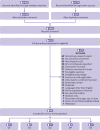Incidence, risk factors, natural history, and hypothesised mechanisms of myocarditis and pericarditis following covid-19 vaccination: living evidence syntheses and review
- PMID: 35830976
- PMCID: PMC9277081
- DOI: 10.1136/bmj-2021-069445
Incidence, risk factors, natural history, and hypothesised mechanisms of myocarditis and pericarditis following covid-19 vaccination: living evidence syntheses and review
Abstract
Objectives: To synthesise evidence on incidence rates and risk factors for myocarditis and pericarditis after use of mRNA vaccination against covid-19, clinical presentation, short term and longer term outcomes of cases, and proposed mechanisms.
Design: Living evidence syntheses and review.
Data sources: Medline, Embase, and the Cochrane Library were searched from 6 October 2020 to 10 January 2022; reference lists and grey literature (to 13 January 2021). One reviewer completed screening and another verified 50% of exclusions, using a machine learning program to prioritise records. A second reviewer verified all exclusions at full text, extracted data, and (for incidence and risk factors) risk of bias assessments using modified Joanna Briggs Institute tools. Team consensus determined certainty of evidence ratings for incidence and risk factors using GRADE (Grading of Recommendations, Assessment, Development and Evaluation).
Eligibility criteria for selecting studies: Large (>10 000 participants) or population based or multisite observational studies and surveillance data (incidence and risk factors) reporting on confirmed myocarditis or pericarditis after covid-19 mRNA vaccination; case series (n≥5, presentation, short term clinical course and longer term outcomes); opinions, letters, reviews, and primary studies focused on describing or supporting hypothesised mechanisms.
Results: 46 studies were included (14 on incidence, seven on risk factors, 11 on characteristics and short term course, three on longer term outcomes, and 21 on mechanisms). Incidence of myocarditis after mRNA vaccines was highest in male adolescents and male young adults (age 12-17 years, range 50-139 cases per million (low certainty); 18-29 years, 28-147 per million (moderate certainty)). For girls and boys aged 5-11 years and women aged 18-29 years, incidence of myocarditis after vaccination with BNT162b2 (Pfizer/BioNTech) could be fewer than 20 cases per million (low certainty). Incidence after a third dose of an mRNA vaccine had very low certainty evidence. For individuals of 18-29 years, incidence of myocarditis is probably higher after vaccination with mRNA-1273 (Moderna) compared with Pfizer (moderate certainty). Among individuals aged 12-17, 18-29, or 18-39 years, incidence of myocarditis or pericarditis after dose two of an mRNA vaccine for covid-19 might be lower when administered ≥31 days compared with ≤30 days after dose one (low certainty). Data specific to men aged 18-29 years indicated that the dosing interval might need to increase to ≥56 days to substantially drop myocarditis or pericarditis incidence. For clinical course and short term outcomes, only one small case series (n=8) was found for 5-11 year olds. In adolescents and adults, most (>90%) myocarditis cases involved men of a median 20-30 years of age and with symptom onset two to four days after a second dose (71-100%). Most people were admitted to hospital (≥84%) for a short duration (two to four days). For pericarditis, data were limited but more variation than myocarditis has been reported in patient age, sex, onset timing, and rate of admission to hospital. Three case series with longer term (3 months; n=38) follow-up suggested persistent echocardiogram abnormalities, as well as ongoing symptoms or a need for drug treatments or restriction from activities in >50% of patients. Sixteen hypothesised mechanisms were described, with little direct supporting or refuting evidence.
Conclusions: These findings indicate that adolescent and young adult men are at the highest risk of myocarditis after mRNA vaccination. Use of a Pfizer vaccine over a Moderna vaccine and waiting for more than 30 days between doses might be preferred for this population. Incidence of myocarditis in children aged 5-11 years is very rare but certainty was low. Data for clinical risk factors were very limited. A clinical course of mRNA related myocarditis appeared to be benign, although longer term follow-up data were limited. Prospective studies with appropriate testing (eg, biopsy and tissue morphology) will enhance understanding of mechanism.
© Author(s) (or their employer(s)) 2019. Re-use permitted under CC BY-NC. No commercial re-use. See rights and permissions. Published by BMJ.
Conflict of interest statement
Competing interests: All authors have completed the ICMJE uniform disclosure form at www.icmje.org/disclosure-of-interest/ and declare: support from the Canadian Institutes of Health Research, SPOR Evidence Alliance, and Public Health Agency of Canada for the submitted work; no financial relationships with any organisations that might have an interest in the submitted work in the previous three years; no other relationships or activities that could appear to have influenced the submitted work.
References
-
- Israel Ministry of Health. Press release: surveillance of myocarditis (inflammation of the heart muscle) cases between December 2020 and May 2021 (Including). 2021. https://www.gov.il/en/departments/news/01062021-03 (accessed 28 October 2021).
-
- Reuters. Israel examining heart inflammation cases in people who received Pfizer COVID shot. 2021 Apr 25, 2021. https://www.reuters.com/world/middle-east/israel-examining-heart-inflamm... (accessed Oct 28, 2021).
-
- Willame C, Sturkenboom M, Weibel D. ACCESS Background rates of adverse events of special interest for monitoring COVID-19 vaccine. 2021. https://www.encepp.eu/documents/DraftReport.pdf (accessed 28 October 2021).
Publication types
MeSH terms
Substances
LinkOut - more resources
Full Text Sources
Medical

